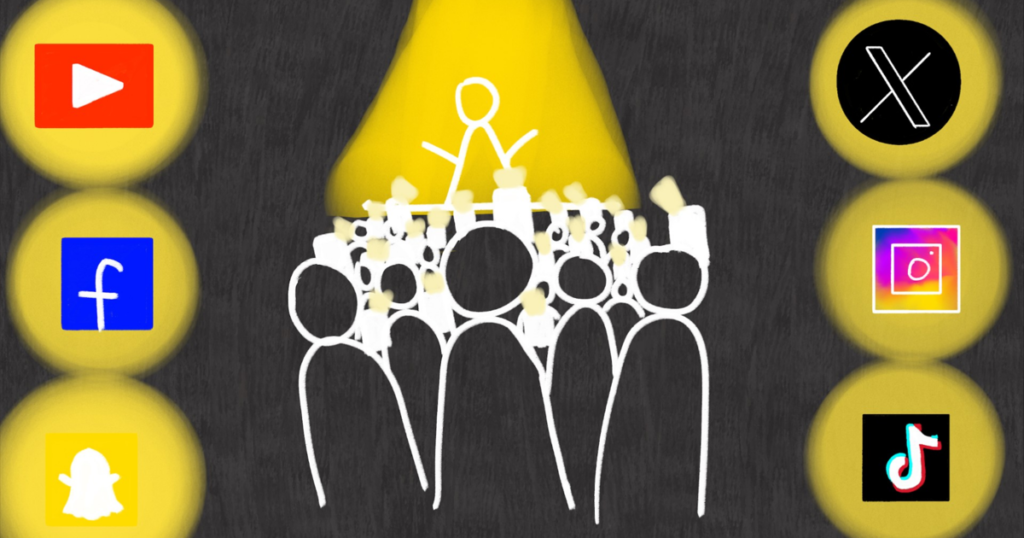As technology develops, so do the ways we share information and communicate. With the birth of the internet came forums and social platforms like Myspace and Tumblr, and eventually Instagram, Twitter, TikTok, and Facebook that we know today.
While these platforms have allowed for easier access to news and fostered relationships, they have also had negative effects, particularly increasing access to the lives of celebrities and other public figures to an almost unhealthy level.
The easy access that celebrity fanbases have into their idols' private lives can lead to intense parasocial relationships that can be difficult to end. Parasocial relationships occur when a person feels a deep personal connection, and sometimes obsession, with another individual, even if the other person does not reciprocate.
As social media has grown in popularity, the inherent interactivity of the platforms has blurred the line between true connection and one-sided pursuit: anyone can register for one or more accounts for free and instantly gain access to the celebrity world, liking and commenting on their content.
The basic functions of social platforms run on algorithms, making it easy for fans to curate their feeds by filtering out everything that isn't their interest. These algorithms recognise patterns in how people use social media and customise what is shown to them based on the content users regularly interact with on the platform.
Of course, social media Social media is an inherently dangerous place to interact with people who are of a different social status than you. In fact, social media allows celebrities to share updates about their latest work and upcoming events, and helps them interact with their fans to find out what they want to see in the future. It is only when these fans start exhibiting obsessive behavior that parasocial relationships become problematic.
A general interest in influential people isn't unhealthy and can even be a positive influence, especially for regular people who need someone to look up to. But when these connections develop to the point where they repeatedly try to contact you or threaten not to return your communications, boundaries need to be set.
Obsessive interest in celebrities without setting boundaries can lead to diminished personal well-being for fans, celebrities, or both. While excessive media consumption can itself lead to poor mental health, the consequences can be exacerbated by parasocial relationships.
When people feel like their relationship efforts are not being rewarded, they can fall into depression and anxiety. Not to mention, putting too much energy into online relationships rather than real ones can diminish the skills needed for relationship building.
Because social media accounts are cultivated rather than comprehensive, they can lead to unrealistic expectations for in-person interactions and relationships. Fans see how celebrities interact with fans at events or socialize with family and friends and may develop expectations that celebrities should always behave in a certain way, and model their own behavior accordingly. These expectations, combined with poor skills, can lead to social isolation and even greater negative impacts on mental health.
To prevent these outcomes, you need to monitor your own social media usage and that of those around you. Starting with understanding your own boundaries and social platforms can help mitigate the reach of parasocial relationships.
With the ease of access to information in today's society, social media users need to become digitally literate to understand how to consume content in a healthy way. Users also need to be aware of whether the online social circles they are involved in foster a negative or obsessive atmosphere that leads to unhealthy parasocial relationships and norms.
The burden does not necessarily fall solely on the shoulders of fans. Owners and operators of social media platforms must be willing to implement features that moderate the extent to which fans can interact with celebrities. In some ways, this idea is already being implemented.
Take Instagram's “business accounts” option, for example: personal accounts can't message business accounts unless they follow each other. This prevents celebrities with professional accounts from being harassed by unknown individuals, at least outside of the comments section. Most platforms also offer options to block and report accounts.
What social media platforms can police is the ability for individuals to continually create new accounts even after previous accounts have been reported or blocked. These platforms should also become less reliant on algorithms, so they are less likely to shoehorn individuals' online experiences into obsessive spaces that they cannot escape on their own.
For the safety of both celebrities and fans, healthy boundaries need to be established, otherwise the tendency for fans to form perverse pseudo-social relationships with their idols will continue.

